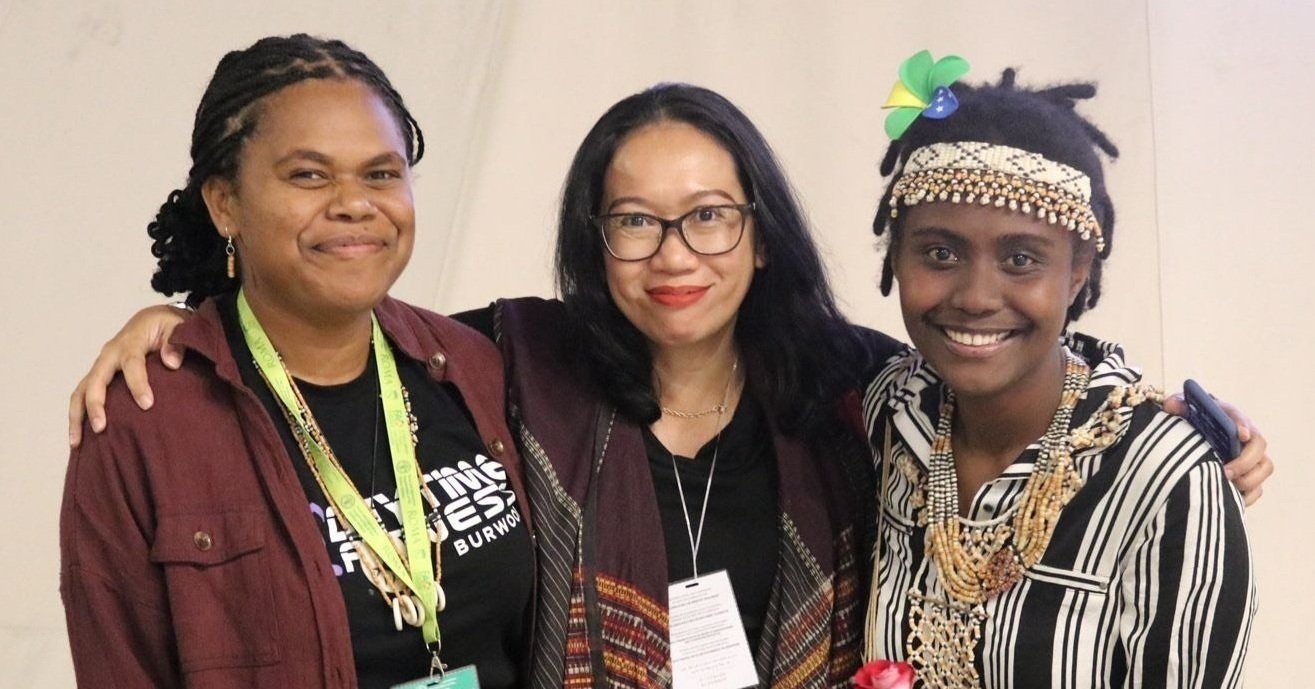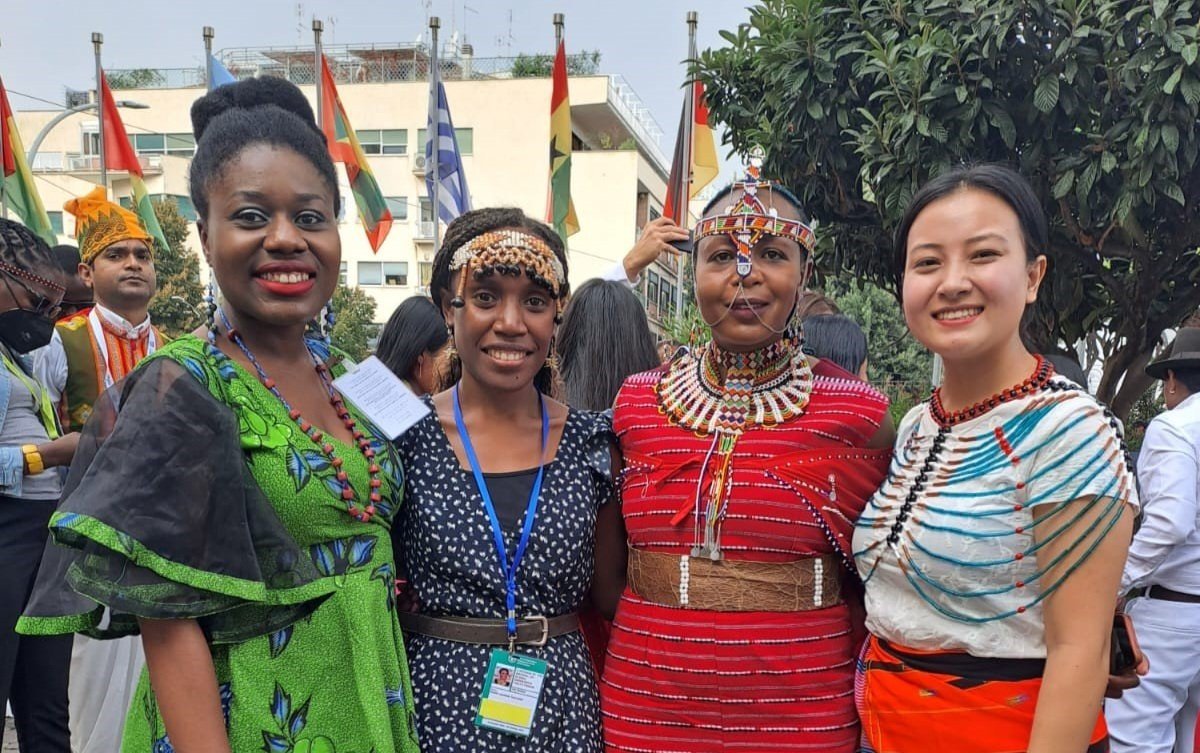Q&A: Voices from the UN Global Indigenous Youth Forum
Blog

In October 2023, over 180 Indigenous youth convened in Rome for the Biennial UN Global Indigenous Youth Forum (UNGIYF) hosted by the Food and Agriculture Organization (FAO). During the 5-day gathering, Indigenous youth from around the world, alongside FAO Members, UN Agencies, high-level government representatives, universities, research centers, and other stakeholders, discussed policies affecting the future of Indigenous peoples’ food and knowledge systems in the context of climate action and biodiversity conservation.
Today we are sitting down with Jasmine Tora ‘eke Rahii and Beth Marisha Mekimo, two attendees from the Solomon Islands who were able to attend with financial sponsorship from the Blue Nature Alliance
Tell us a little about yourself, what is your personal and educational background?
Jasmine: I am an Indigenous youth from the Solomon Islands and I recently graduated from Solomon Islands National University (SINU) with a Bachelor’s in Fisheries Studies and am currently working with Beth Mekimo to research traditional fishing gear used by my people from Makira Province.
Beth: I am a 25-year-old Melanesian native of the Nou Bwebla tribe from Santa Cruz Island in the easternmost Temotu province of the Solomon Islands. I just completed my Bachelor of Fisheries Studies from SINU and am now working as a part-time assistant graduate researcher documenting different types of traditional fishing methods and gear, such as the “Aohe” freshwater eel fish trap from Makira and Ulawa province.
What motivated you to be a part of this year’s UN Global Indigenous Youth Forum?
Beth: Apart from developing my capacity as an early career professional and future policymaker, two pressing issues within my local community motivated me to attend the UNGIYF. First, in my local community, my people have traditionally engaged in “nambo” production to support and feed themselves. This food, made by drying breadfruit using hot air, is unique to the Temotuans on the far eastern part of the islands and plays a significant role in the Indigenous food systems in my community. Effects of climate change have decreased the breadfruit harvest, negatively impacting nambo production and my community’s food security.
Second, Indigenous fishing knowledge in the Solomon Islands is slowly being lost due to the introduction of Western fishing gear and methods. It was once cheaper and more accessible to use traditional gear because everyone knew how to make them, but now, there are no defined mechanisms in place to ensure that knowledge transfers from one generation to another and we are becoming dependent on buying imported gear. The loss of Indigenous fishing knowledge also means the loss of other parts of our cultural heritage like traditional fish preparations, rituals, and preservation methods.
Jasmine: One of the major contributions to loss of culture in the Solomon Islands is climate change. Living near the coast, we have experienced sea level rise as it erodes the coastline, causing parts of our island to sink away. Salt intrusion is killing many of the coastal trees, and villagers are being pushed further inland, often onto someone else’s land, which causes land disputes and tension. These issues are important to address because there is nowhere else for us to go. To leave our island would mean to leave behind everything we are: our land, our history, and our identity.
By attending the UN Global Indigenous Youth Forum and being involved in global decision-making processes I feel that I can be a voice for the concerns of my community. We cannot afford to keep waiting for action on climate change because with every minute that passes the stakes are getting higher. As the seas rise, they take with them a few inches of sand from our beaches along with pieces of our history. Nature waits for no man and the longer we prolong action, the more coastal people will suffer.
What was it like to attend the forum?
Jasmine: To be honest, as a girl from a small island nation, I was worried about being intimidated and scared, but luckily that was not what happened. I found the atmosphere at FAO Headquarters to be welcoming to everyone and I felt confident to freely share my thoughts and ideas around the challenges faced by small-scale artisanal fisheries in the Solomon Islands.
Beth: I was inspired to see other people my age engaging in and leading initiatives in their communities. This has boosted my confidence and drive to do the same. I was happy to make friends and exchange contacts with many other Indigenous youth whom I know I will remain in contact with, and continue to learn from, even after the forum.

What issues or topics were you able to highlight in the discussions that are unique to the Solomon Islands or the Pacific region?
Beth: Climate change is of particular concern for islanders in the Pacific region as it is severely affecting our coastlines and food security. Some of the most vulnerable crops are staple food sources like breadfruit and cut nut. In Nea village, where I am from, all the breadfruit trees near the coast no longer bear fruit and their leaves are turning yellow and brown due to saltwater intrusion. Ocean acidification and rising temperatures are also causing the die-off of our coral reef ecosystems which are important habitats for tropical fish that islanders are dependent on for food. Almost every person in my country lives by the coast and eats fish daily.
I spoke about the threats affecting our food systems at an Indigenous Youth in Fisheries meeting and was given the opportunity to contribute my ideas for policy recommendations to address these issues. I also explained our concerns around fish post-harvest loss, loss of Indigenous fishing knowledge, and financial barriers to fisheries research and shared what I am doing to document traditional fishing methods as a solution to help prevent the loss of Indigenous knowledge.
Was there a specific speaker or discussion group that you participated in during the forum that you found particularly interesting or important?
Jasmine: One session that stood out to me was a science and innovation forum where speakers presented ideas that combined scientific and traditional Indigenous knowledge to address issues caused by climate change. Derrick James Mesh, an Indigenous youth from Yucatec Mayan, Belize spoke about his peoples' traditional seed banking and preservation methods and explained how his work helps to ensure that native plants will continue to persist in the face of climate change. This was particularly fascinating to me because, as the Solomon Islands have been increasingly affected by climate change, so too has our dependence on imported goods. Historically, we have native fruits, vegetables, and root crop species but imports of non-native plants threaten their persistence on the islands. Having a seed bank might be a very good way to support local farmers and help to reduce the increasing rate of non-communicable diseases (like diabetes, and atherosclerotic cardiovascular disease) in the country by making healthy food more accessible.
Beth: I attended a panel that emphasized the value of integrating Indigenous knowledge to solve environmental problems. We discussed the importance of establishing partnerships with communities to ensure that Indigenous knowledge and data are meaningfully and respectfully utilized in resource management planning and implementation. They highlighted an obstacle that I have experienced as challenging in my own work documenting traditional fishing gear and methods -- that many Indigenous people are wary of Western science. This panel stressed the importance of fostering trust by including Indigenous people in the design of Western scientific practices, taking care that Indigenous people fully agree to the methods of knowledge transfer and Western scientists must seek out proper consultations. These discussions have contributed to the way I think about my current work and will stick with me as I continue building my career as a researcher.

What are your plans after attending the forum?
Jasmine: I would like to go back to my community and present what I learned during my trip to Rome. I want to show them why it is important to preserve our cultures and traditions and let them know that the global community is concerned for us and sees us as important. In the future, I plan to participate in the next Indigenous Youth Forum and other similar events to be able to speak for my people and negotiate solutions to the challenges that they face.
Beth: The Solomon Islands delegates plan to establish a social media platform to raise awareness about climate change and its effects on our food systems. Our research team will also conduct education and outreach events to collaborate with local communities to address food system challenges so we may develop hand-in-hand resolutions and initiatives to address these issues. Involving the people in designing solutions for these challenges is crucial since they will be the ones to execute them.
How has participating in the forum left an impression on you?
Beth: The forum was an eye-opener for me. In my country, the impacts of climate change on Indigenous food systems are often overlooked and not given the attention they deserve at national, regional, and international meetings. However, participating in the UNGIYF has made me realize that, as an Indigenous youth, I can bridge these gaps in the decision-making process by engaging in more advocacy work to bring Indigenous issues to light. I am more confident and motivated to take serious action toward addressing these issues at local, regional, and global scales.
Jasmine: My future goals have only been reinforced by attending this forum. I have seen ways in which I can use my career and knowledge to better serve my people and the next generation. What struck me most was all the friendships I formed with youths from around the world and seeing them advocate for their beliefs. They inspire me to pursue my goals and to be bold and confident because if they can do it, so can I.
I look forward to seeing the fruits of our labors. I won’t feel as though my voice has been heard until real action is taken to address the concerns that were voiced during this forum. After all, what good are words on paper if nothing is being done? I will be waiting to see if what we drafted is put to work. Only then can I truly say that yes, Indigenous youths are also part of the decision-making process, and our voices are heard.

The Blue Nature Alliance is currently partnering with the International Union for Conservation of Nature Oceania (IUCN-Oceania), the Government of Solomon Islands’ Ministry of Environment and Ministry of Fisheries, and the Oceans12 Technical Working Group to establish a network of Marine Protected Areas (MPAs) encompassing 15% of the nation’s EEZ, or 238,321 sq. km. This engagement pursues protections in inshore and offshore ocean areas in the Solomon Islands by focusing on completing marine spatial planning (MSP) consultations and the designation of a network of MPAs, building community support and expanding locally managed marine areas, and advancing a sustainable and inclusive ocean finance model.
